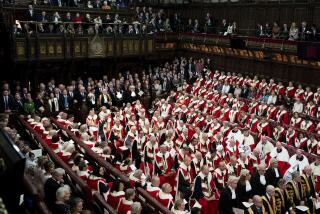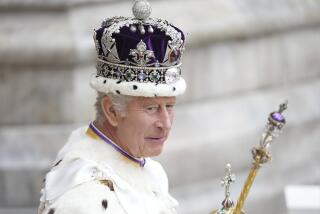A British Right of Birth Appears Close to Death
- Share via
LONDON — With his aristocratic title dating back to the Middle Ages and a mother born in the Palace of Westminster at the turn of the century, it is little wonder that Baron Mowbray, Segrave and Stourton feels at home in the House of Lords.
The Mowbray lion crest is one of the oldest noble emblems decorating the broad stairwells of Britain’s upper house of Parliament. A hallway serves as a family picture gallery for Lord Mowbray, who points out his grandfather in one oil portrait of Parliament from 1893 and his grandmother observing proceedings in another.
Mowbray is a hereditary peer, which means that he inherited his father’s seat in a chamber made up largely of fellow members of the aristocracy. It also means that his 35th session in the House of Lords could be his last.
Prime Minister Tony Blair has introduced legislation to abolish the centuries-old rights of hereditary peers to sit and vote in the upper house. If the measure is approved as expected, Lord Mowbray and his fellow peers could be out of the House of Lords by summer.
“I am coming up on 76 in March, so God may call me before Mr. Blair kicks me out, but of course I shall be sad to leave,” Mowbray said. “I love this place. It is a clubbable place where you can talk to anybody about anything. We’ve all been through wars together. We all see fairly clearsightedly. And the country needs to be governed.”
The question is who will do the governing, or at least the revising of House of Commons legislation, which is the primary role of the House of Lords. Also, how to make the upper house look less like a fusty gentlemen’s club and more like a modern branch of government.
The pomp and ceremony surrounding the lords--many of them elderly men donning 15th century ermine robes for ceremonies--have long been a source of ridicule, even by some of their own. The 18th century earl of Chesterfield called the chamber “that hospital of incurables,” while the late Lord Soper said it was “good evidence of life after death.”
The House of Lords traces its origins back to William the Conqueror in 1081, when his council of barons was first referred to as a “parliament.” Oliver Cromwell briefly abolished the House of Lords after the execution of Charles I in 1649, but it was soon reinstated, and the supremacy of Parliament over the monarchy was established in 1688.
The elected House of Commons is the predominant body, naming a prime minister from the majority party, and the House of Lords is relegated to the role of watchdog. Its principal power beyond repairing poorly drafted legislation, and delaying that which it does not like, is to call elections in the event a government should try to prolong its life beyond the legal five-year term.
Currently, there are 1,295 members of the House of Lords, 759 of them hereditary peers. The rest are life peers--a category created by the Conservative government the last time the upper chamber was reformed in 1958--who are appointed for their achievements but cannot pass their titles on to descendants. All of the lords are unsalaried and typically hold other jobs or are retired from them.
Labor Party Favors Ending Birthright
Blair and his Labor Party faithful say that on the cusp of the 21st century, there is no justification for hereditary peers to sit in Parliament solely by virtue of birth and so long as they stay alive.
“Seven hundred and fifty people there by accident of birth, almost all men, almost all white, most with little, if any, experience of school or health care or housing issues in common with most of their fellow countrymen and women,” Commons leader Margaret Beckett said in opening a debate on the bill to reform the House of Lords. “Like everyone else, they have a place in our national life. It is not in our Parliament.”
It also happens that the vast majority of hereditary peers are Tories, and many allege that Blair is proposing a major constitutional change in order to strengthen his own party and silence the opposition.
“The proposal to abolish the hereditary peers in cavalier fashion is a case of gerrymandering the institutions of Parliament to suit the government who happen to be in office at present,” Baroness Young, a life peer, said on the floor of the House of Lords.
To deflect such criticism, Blair has appointed Lord Wakeham, a respected Tory, to head a royal commission charged with drawing up plans for selecting new members of the House of Lords to replace the hereditary peers by 2002.
Blair acknowledges that he wants to level the playing field but says he is equally interested in modernizing a branch of government filled with what many Britons regard as eccentric museum pieces and over-bred do-nothings--an image reinforced by the 7th marquess of Bristol, Frederick John Hervey, who died a heroin addict last month at the age of 44.
Most hereditary peers either never take up their seats in the House of Lords or seldom show up. Lord Mowbray is one of about 200 to 300 hereditary peers who are active in the House of Lords on a regular basis. Known to his friends as Charles, Lord Mowbray is easily distinguished by the black eye patch he wears over the wound he suffered in World War II when his tank was blown up in France.
Seated by a window overlooking the Thames in what the peers call the “Guest Room,” but what the uninitiated would call a bar, Lord Mowbray has the unusual perspective of an insider who sees himself as an outsider--a Roman Catholic aristocrat among Protestants. He complained to his old friend Lord Denham, for what cannot be the first time, that his family was denied access to money and power during the 17th and 18th centuries, saved from ruin only by good marriages until Catholic emancipation in 1829.
“I’m terribly sorry, Charles,” Lord Denham answered dryly. “We were very hard on you.”
It is apparent that Mowbray believes that Britain’s Labor government and liberal public are being hard on him once again, although like most hereditary peers, he no longer tries to justify his right to a seat. (“We’re not stupid,” he said.)
But the Tory lord does defend the work the hereditary peers have done, the traditions they uphold and the honor of their institution.
“We are a good, mixed bunch, and we haven’t done too badly,” Lord Mowbray said over a glass of sherry.
“At the moment, we are the only check on what the church called the democratic dictatorship of the House of Commons,” he said. “We will not go until we have a guarantee . . . that we will have a chamber that has got the power of holding things up if they [the Commons] do things wrong.”
The lords take pride in what they consider to be the high quality and civility of debate in their chamber. Because they are not running for reelection, they say, they speak in order to persuade each other, and not to perform for the masses. No cameras or television crews are allowed in the House of Lords.
The lords stress the independence that comes with their life terms. Not only can they risk taking unpopular stands, they can break rank with party whips when they feel compelled, a freedom seldom exercised in the House of Commons. And unlike the lower chamber, the House of Lords has “cross-benchers,” members who refuse to declare a party affiliation.
And while the public mocks the lords as aged anachronisms, Lord Russell, the son of the late philosopher Bertrand Russell, responds that one should not underestimate the intelligence or determination of the elderly. “No one is quite as immune to patronage as a 90-year-old,” he said.
Many Peers Fear for Future of Monarchy
Lady Strange, 70, is one of the few who defend the principle of inheritance. Best known in the upper house for delivering fresh-cut flowers from her garden at Megginch Castle (a “jolly cold” castle with a leaky roof, she laments), Lady Strange says that jealous old socialists have turned “hereditary” into a dirty word.
“Hereditary is what civilization and family is all about. It is about grandparents, parents and children,” she said.
Like many peers, she argues that abolishing the hereditary members’ right to vote in the House of Lords is the first step toward abolishing the monarchy.
The House of Lords reform has cleared two of three votes required for passage in the House of Commons. Labor is holding on to a compromise proposal, which would allow 91 hereditary peers to remain in the chamber until new rules of selection have been decided, as a bargaining chip to get the bill through the House of Lords.
A few lords have threatened to use legislative guerrilla tactics to stop the pending measure, dragging their feet on all government bills, trying to identify themselves with popular issues and even taking Blair to court.
“I would regard that as my final duty and would be proud to go out as a football hooligan,” Lord Onslow said.
Many of the Tory lords distrust the government’s two-stage reform of abolishing hereditary peers and then deciding how to replace them. They suspect that the government will eventually stack the chamber with Labor appointees.
It does not help that the government is vague about the future makeup of the House of Lords. Officials say it is up to the Royal Commission, although the government’s policy paper on the reform makes clear it prefers a partially elected, partially appointed upper house.
While much political wrangling is still to come on the House of Lords reform, most hereditary peers acknowledge that their days as lords are numbered.
“Most hereditary peers realize we have to go and that the party imbalance [in the House of Lords] is unacceptable,” said Lord Russell, who supports reform. “The real question is whether we go quietly or with blood on the ground.”
More to Read
Sign up for Essential California
The most important California stories and recommendations in your inbox every morning.
You may occasionally receive promotional content from the Los Angeles Times.













